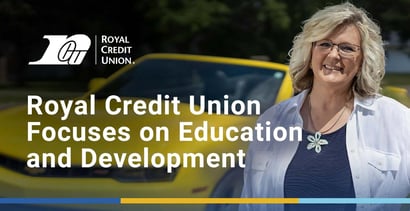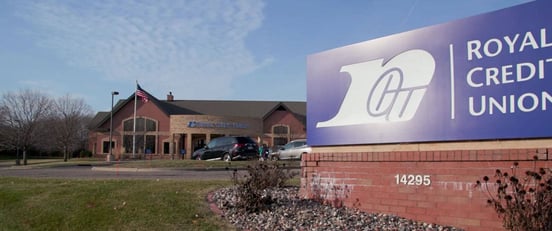

In a Nutshell: As a certified community development financial institution, Royal Credit Union takes pride in serving and supporting members from diverse personal and financial backgrounds. The credit union offers a suite of products and services to help members improve their standing and prospects. It provides special consideration and guidance to those who find themselves in difficult situations and extends benefits beyond its member base to the community at large. Royal Credit Union also educates young people, incarcerated individuals, and people in rehab programs to provide a solid foundation for a stronger financial future.
Many people rely on others to offer support, guidance, and information that helps them pursue a task or goal. Those people may be teachers in school or managers and experienced coworkers in the workplace. In the financial space, they may be the institutions people entrust with their money.
The most critical component in that relationship is trust. Banks and credit unions must inspire confidence, not only in how they treat people but also in how they treat communities. Consumers particularly rely on credit unions to provide education and monetary benefits to members.
In Wisconsin and Minnesota, consumers often put that trust in Royal Credit Union. Royal has 22 branches serving 42 counties and manages approximately $3.4 billion in assets. The credit union also maintains 29 student branches embedded in public schools — from elementary to high school.

Royal aims to lift up the people and communities it serves by providing beneficial financial products and the knowledge to make intelligent choices with money. And that is true for both members of the institution and community members, regardless of their credit scores, financial situations, or personal histories.
“We try to meet people wherever they’re at, so we have a full financial literacy team, which is not common,” said Kristen Norgaard, Financial Education Supervisor at Royal Credit Union. “We have a manager who only oversees financial education. The purpose is to educate and be in our schools and our communities. That helps us to live our core purpose. I would say everybody at the credit union is passionate about that.”
Accessibility, Flexibility, and Counseling Services Prioritize Member Well-Being
One of Royal’s foundational commitments is making its products and services accessible to everyone — regardless of financial standing. For example, the minimum deposit necessary to gain membership in the credit union is only $5. Interest rates on loans vary based on the borrower’s credit score, of course, but Norgaard said the rates are “very, very fair.”
Royal offers a savings secured loan to help low-credit members build stronger financial positions and qualify for more advantageous products. Proof of improvement can be just as beneficial as achieving a high score.
“We don’t have black-and-white things that we have to fit into. We’ve got a lot of gray areas,” Norgaard said. “We have the room to say, ‘Okay, is this person’s situation improving?’ And that doesn’t always mean that we’re going to be able to give you a loan, but we’ll talk about what steps we need to see you take so you can obtain a loan.”
Royal offers free financial reviews with one of the credit union’s certified financial counselors to help members along that path. Representatives go over the member’s finances and goals and help them design a roadmap to succeed.
During 2020, many member goals shifted as the COVID-19 pandemic affected their financial situations. Royal offered them the flexibility they needed, including skipping payments on loans without penalties or fees, to make ends meet during those challenging times.
“There are a ton of people who took advantage of that,” Norgaard said. “There’s a whole team of people committed to adjusting due dates on loans and working hand in hand with those members.”
CDFI Programming Helps Underserved Communities Thrive
As a certified community development financial institution, Royal can extend loans and credit to people who otherwise may not qualify. The credit union takes its designation and mission seriously, and strives to extend benefits to more community members.
“We’re trying to serve those individuals and communities that are low income and need access to those products and services,” said Cooper Larson, Community Financial Education Coordinator at Royal. “Royal was able to originate over $330 million in home and consumer loans to those low-income members, which is a pretty big number and highly impactful for those communities.”

Royal Credit Union offers a diverse line of financial products for its members.
As member-owned, community-oriented institutions, credit unions are often better positioned to provide these kinds of products to unbanked and underbanked individuals. And as a certified CDFI, Royal has access to federal grants — $4.6 million worth — that expand its opportunity to help uplift the communities they serve.
Royal has provided more than 4,000 loans under $1,000. Small loans are less common at larger institutions because they’re rarely profitable for the institution. But profit is not the motivation behind Royal’s products. Instead, they’re driven by the good they can do for borrowers. Despite the modest dollar values, the benefits can be substantial in short-term well-being and in building toward more stable financial futures in the long term.
“We really serve those members,” Larson said. “We’re constantly making small loans, and incremental progress with them, toward their potential and their future.”
Financial Education Provides Hands-On Experience
Part of that brighter financial future hinges on education. If people don’t understand credit and interest or how to manage money properly, loans can end up doing more harm than good. That’s why Royal emphasizes financial education starting as early as possible.
Royal’s financial literacy efforts include direct education for children in public schools. Its team members deliver standards-based information through lectures and hands-on training regardless of the age group they work with.
Royal operates student-run credit union branches in elementary, middle, and high schools where students conduct transactions and help promote financial literacy and responsibility among their classmates. High school team members are hired from the Business Youth Apprenticeship and Financial Youth Apprenticeship programs. Their high school locations offer many of the same services available at their regular locations, and student team members may also work as tellers at other Royal Credit Union locations.
Royal has developed a suite of signature financial education programs to offer in schools. Takeover Day Featuring The Superheroes of Saving is their signature program in elementary schools. Financial education experts takeover the school wearing their super hero caps to provide financial education lessons to all students in just one day. In middle schools, representatives run a multiweek entrepreneurship program, Future US Entrepreneurs (FUSE) through which students develop their own businesses.

Royal Credit Union has 22 branches and 29 student-run branches in schools.
“We brainstorm, and we come up with a business plan. Then, we figure out how to market it, and talk about pricing our product,” Larson said. “We’ve done it virtually during COVID-19, which has been cool and something we haven’t done before.”
Royal also offers Test Drive … Next Stop Reality for high school students. Students choose a career, research the education — and student loan debt — required to pursue it, and are assigned a family status. During the simulation, they must perform real-world tasks, including balancing a monthly budget and dealing with unexpected expenses.
“In April, we collaborated with the Wisconsin Department of Public Instruction. They took our program and put it on the academic and career planning website that they use for the whole state,” said Deb Paulsen, Community Financial Education Coordinator at Royal. “There are schools in other states and credit unions in other states that have reached out to us that we shared it with as well. So that was a huge undertaking, but worth it. We received the Wisconsin Governor’s Financial Literacy Award for that program in 2020.”
Royal Credit Union Offers Paths to a Better Financial Future
Providing education to young people is crucial to prepare them for financial responsibility as adults. But youths are not the only ones who need the education to improve their futures.
“I oversee our correctional facility program, which is a really special thing that Royal offers,” Larson said. “We are in three county jails and one state DOC treatment facility. Today, we’ve impacted over 1,300 individuals, and we’re doing a study on the effectiveness of that program.”
Royal is involved in drug and alcohol rehabilitation programs. As patients recover physically, mentally, and emotionally from substance abuse, they can gain the knowledge they need to recover financially. Through this financial counseling, they learn about building relationships with institutions and understanding credit so they can have a fresh financial start after they complete their programs.
Royal plans to research offering a second-chance checking account, as well. This product would be available for individuals who are unbanked due to past mistakes that prevent them from qualifying to open an account a most financial institutions. Though Royal’s financial education outreach with for rehab patients and incarcerated individuals, and other underserved populations, they are especially aware of how this account would provide those individuals with an opportunity to put their knowledge into action and work toward a stable financial future.
“They want an account somewhere, but how can they get one with their past? Having that product for them is something that we’re exploring right now,” Paulsen said.
Advertiser Disclosure
BadCredit.org is a free online resource that offers valuable content and comparison services to users. To keep this resource 100% free for users, we receive advertising compensation from the financial products listed on this page. Along with key review factors, this compensation may impact how and where products appear on the page (including, for example, the order in which they appear). BadCredit.org does not include listings for all financial products.
Our Editorial Review Policy
Our site is committed to publishing independent, accurate content guided by strict editorial guidelines. Before articles and reviews are published on our site, they undergo a thorough review process performed by a team of independent editors and subject-matter experts to ensure the content’s accuracy, timeliness, and impartiality. Our editorial team is separate and independent of our site’s advertisers, and the opinions they express on our site are their own. To read more about our team members and their editorial backgrounds, please visit our site’s About page.




